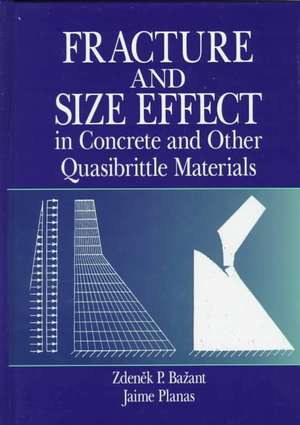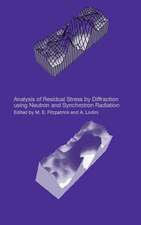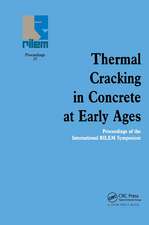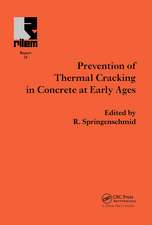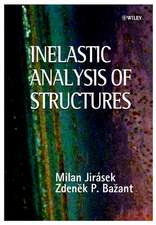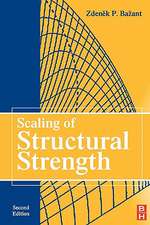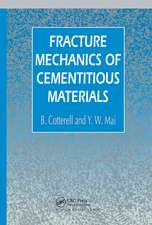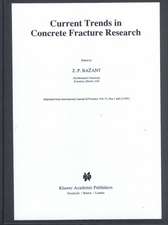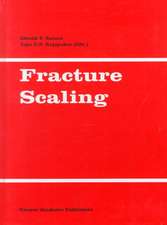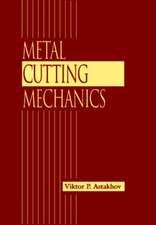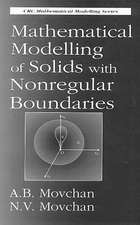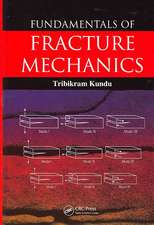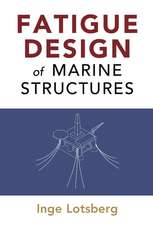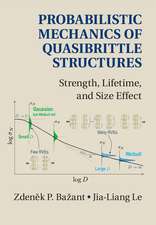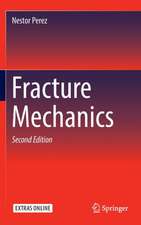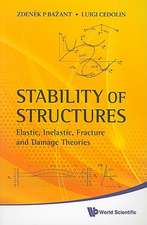Fracture and Size Effect in Concrete and Other Quasibrittle Materials: New Directions in Civil Engineering
Autor Zdenek P. Bazant, Jaime Planasen Limba Engleză Hardback – 29 dec 1997
The many recent results on quasibrittle fracture and size effect, which were scattered throughout many periodicals, are compiled here in a single volume. This book presents a well-rounded discussion of the theory of size effect and scaling of failure loads in structures. The size effect, which is the most important practical manifestation of fracture behavior, has become a hot topic. It has gained prominence in current research on concrete and quasibrittle materials.
The treatment of every subject in Fracture and Size Effect in Concrete and Other Quasibrittle Materials proceeds from simple to complex, from specialized to general, and is as concise as possible using the simplest level of mathematics necessary to treat the subject clearly and accurately. Whether you are an engineering student or a practicing engineer, this book provides you with a clear presentation, including full derivations and examples, from which you can gain real understanding of fracture and size effect in concrete and other quasibrittle materials.
Preț: 1685.99 lei
Preț vechi: 2056.08 lei
-18% Nou
Puncte Express: 2529
Preț estimativ în valută:
322.72€ • 350.66$ • 271.26£
322.72€ • 350.66$ • 271.26£
Carte tipărită la comandă
Livrare economică 21 aprilie-05 mai
Preluare comenzi: 021 569.72.76
Specificații
ISBN-13: 9780849382840
ISBN-10: 084938284X
Pagini: 640
Ilustrații: 6 tables, 1 halftone and 1683 equations
Dimensiuni: 178 x 254 x 39 mm
Greutate: 1.38 kg
Ediția:New.
Editura: CRC Press
Colecția CRC Press
Seria New Directions in Civil Engineering
ISBN-10: 084938284X
Pagini: 640
Ilustrații: 6 tables, 1 halftone and 1683 equations
Dimensiuni: 178 x 254 x 39 mm
Greutate: 1.38 kg
Ediția:New.
Editura: CRC Press
Colecția CRC Press
Seria New Directions in Civil Engineering
Public țintă
ProfessionalCuprins
Why Fracture Mechanics?, Historical Perspective, Reasons for Fracture Mechanics Approach, Sources of Size Effect on Structural Strength, Quantification of Fracture Mechanics Size Effect, Experimental Evidence for Size Effect, Essentials of LEFM, Energy Release Rate and Fracture Energy, LEFM and Stress Intensity Factor, Size Effect in Plasticity and in LEFM, Determination of LEFM Parameters, Setting Up Solutions from Closed-Form Expressions, Approximate Energy-Based Methods, Numerical and Experimental Procedures to Obtain KI and G, Experimental Determination of KIc and Gf, Calculation of Displacements from KI-Expressions, Advanced Aspects of LEFM, Complex Variable Formulation of Plane Elasticity Problems, Plane Crack Problems and Westergaard's Stress Function, The General Near Tip Fields, Path-Independent Contour Integrals, Mixed Mode Fracture Criteria, Equivalent Elastic Cracks and R-Curves, Variability of Apparent Fracture Toughness for Concrete, Types of Fracture Behavior and Nonlinear Zone, The Equivalent Elastic Crack Concept, Fracture Toughness Determination Based on Equivalent Crack Concepts, Two Parameter Model of Jenq and Shah, R-Curves, Stability Analysis in the R-Curve Approach, Determination of Fracture Properties from Size Effect, Size Effect in Equivalent Elastic Crack Approximations, Size Effect Law in Relation to Fracture Characteristics, Size Effect Method: Detailed Experimental Procedures, Determination of R-Curve from Size Effect, Cohesive Crack Models, Basic Concepts in Cohesive Crack Model, Cohesive Crack Models Applied to Concrete, Experimental Determination of Cohesive Crack Properties, Pseudo-Boundary-Integral Methods for Mode I Crack Growth, Boundary-Integral Methods for Mode I Crack Growth, Crack Band Models and Smeared Cracking, Strain Localization in the Series Coupling Model, Localization of Strain in a Softening Bar, Basic Concepts in Crack Band Model
Descriere
Fracture and Size Effect in Concrete and Other Quasibrittle Materials provides a comprehensive treatment of the topic that does not give merely the facts - it provides true understanding. It presents a well-rounded discussion of the theory of size effect and scaling of failure loads in structures. The treatment of every subject in proceeds from simple to complex, from specialized to general, and is as concise as possible using the simplest level of mathematics necessary to treat the subject clearly and accurately. Whether you are an engineering student or a practicing engineer, this book provides you with a clear presentation, including full derivations and examples, from which you can gain real understanding of fracture and size effect in concrete and other quasibrittle materials.
